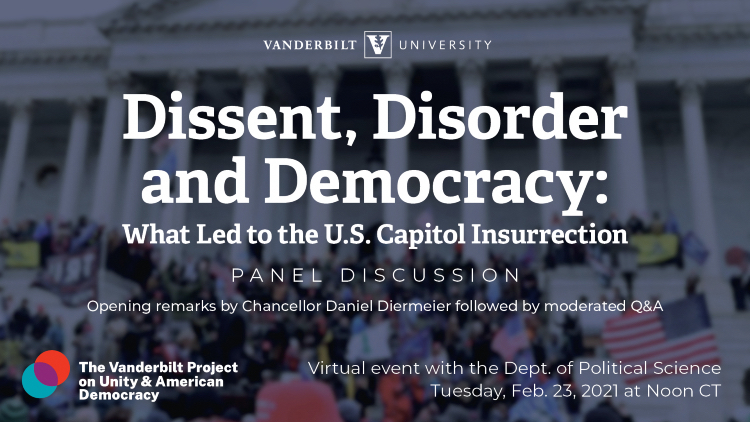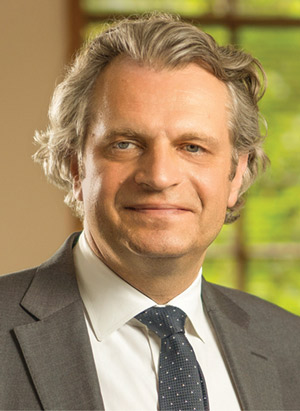
A panel of faculty from the Vanderbilt Department of Political Science will examine the social, legal and psychological causes and consequences of the Jan. 6 riot at the U.S. Capitol during a live virtual conversation hosted by The Vanderbilt Project on Unity and American Democracy on Tuesday, Feb. 23, at noon CT.
“Dissent, Disorder and Democracy: What Led to the U.S. Capitol Insurrection” will feature perspectives by five faculty members, followed by a moderated Q&A. The event is exclusive and open to the Vanderbilt community, including all students, faculty, postdoctoral fellows, staff and alumni with a VUnetID. Registration is required.

Alumni – Register here.
All others – Register here.
“The deeply troubling Jan. 6 assault on the U.S. Capitol is among many issues compelling us to elevate research and reason into the national political discourse,” said Chancellor Daniel Diermeier. “Vanderbilt is uniquely positioned to help unite our nation by advancing evidence-based scholarship and by convening compelling discussions with world-class faculty and global thought leaders.”
Alan Wiseman, Cornelius Vanderbilt Chair, professor of political science and co-director of the Center for Effective Lawmaking, who also serves as chair of the political science department, will moderate the event.
“We hope that our students will take advantage of this opportunity for critical reflection and discussion on an important issue,” Wiseman said. “We chose to schedule this event on a mid-semester Reading Day to encourage student participation in this critical and timely conversation.”
The other panelists, all of whom are members of the political science faculty, are:
- Larry M. Bartels, May Werthan Shayne Chair of Public Policy and Social Science and co-director of the Center for the Study of Democratic Institutions. He will discuss his recent research focusing on the political preferences and priorities of Republican-identifying voters.
- Cindy Kam, William R. Kenan, Jr. Chair, professor of political science and director of the Research on Individuals, Politics and Society Lab. She will provide a political psychology perspective on how people view out-partisans and grapple with the partisan divide.
- Edward Rubin, University Professor of Law and Political Science and professor of political science. He will outline the constitutional and legal requirements underlying the special session of Congress on Jan. 6 while also commenting, from his perspective as a social theorist, on the rioters’ possible motives.
- Elizabeth Zechmeister, Cornelius Vanderbilt Chair, professor of political science and director of the Latin American Public Opinion Project. She will discuss her research on what mass political behavior in fractured democracies suggests about the causes of the insurrection at the U.S. Capitol and how it compares with similar events in less robust democracies.
A recording will be available for the Vanderbilt community after the event.
The Vanderbilt Project on Unity and American Democracy is a nonpartisan initiative that aims to elevate research and evidence-based reasoning in the national discourse. The core contributions of the project are the dissemination of research and evidence-based papers from renowned thought leaders and timely and crucial conversations with influencers of all political persuasion. The timely endeavor aims to give policy makers and the public the tools needed to combat conspiracy and unfounded ideology with evidence, data and respectful discourse.
The project is led by co-chairs former Republican Tennessee Gov. Bill Haslam, Pulitzer Prize–winning presidential biographer and Vanderbilt faculty member Jon Meacham, and former White House Fellow and Research Professor of Political Science and Law Samar Ali, BS’03, JD’06.
Learn more at www.vanderbilt.edu/unity.